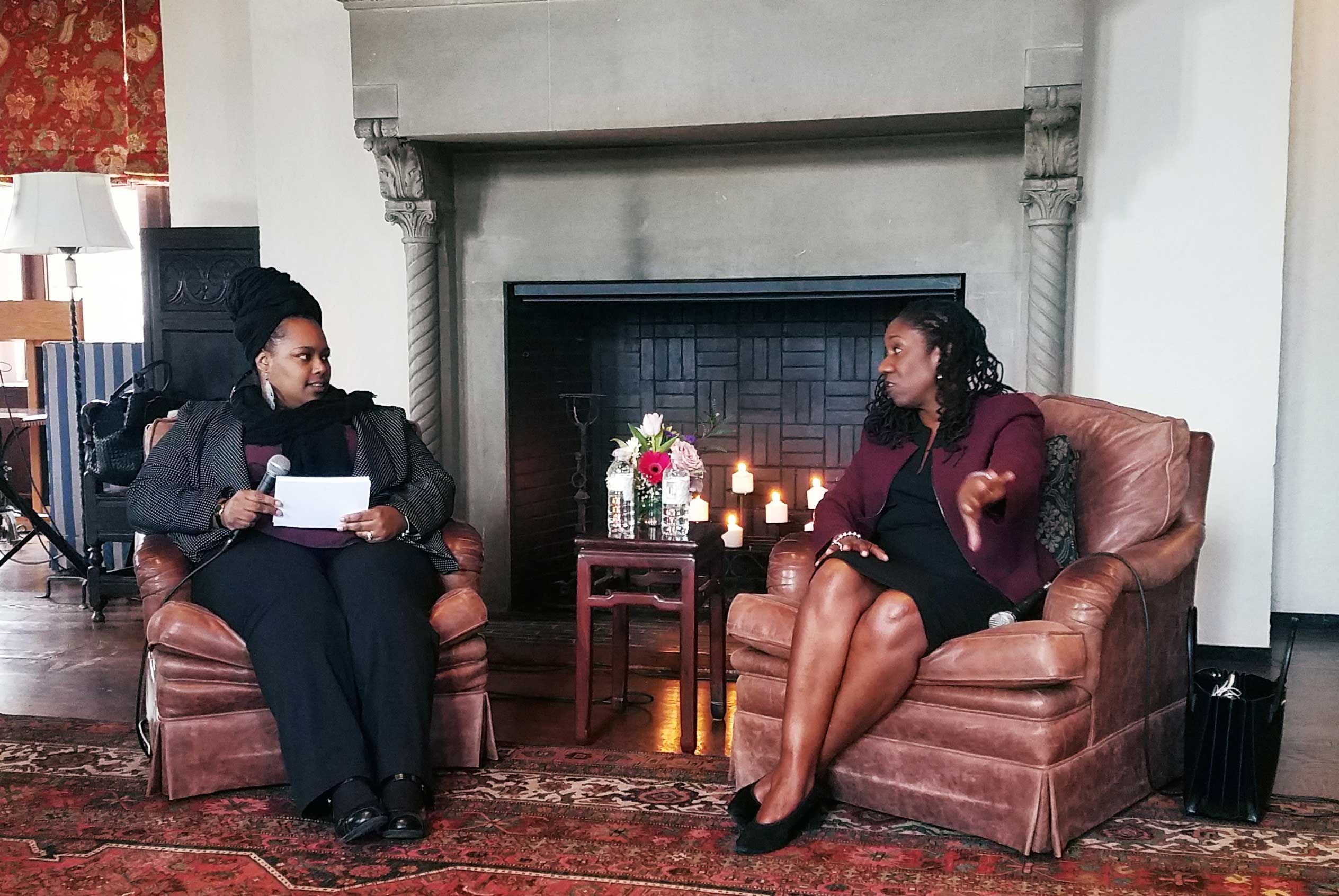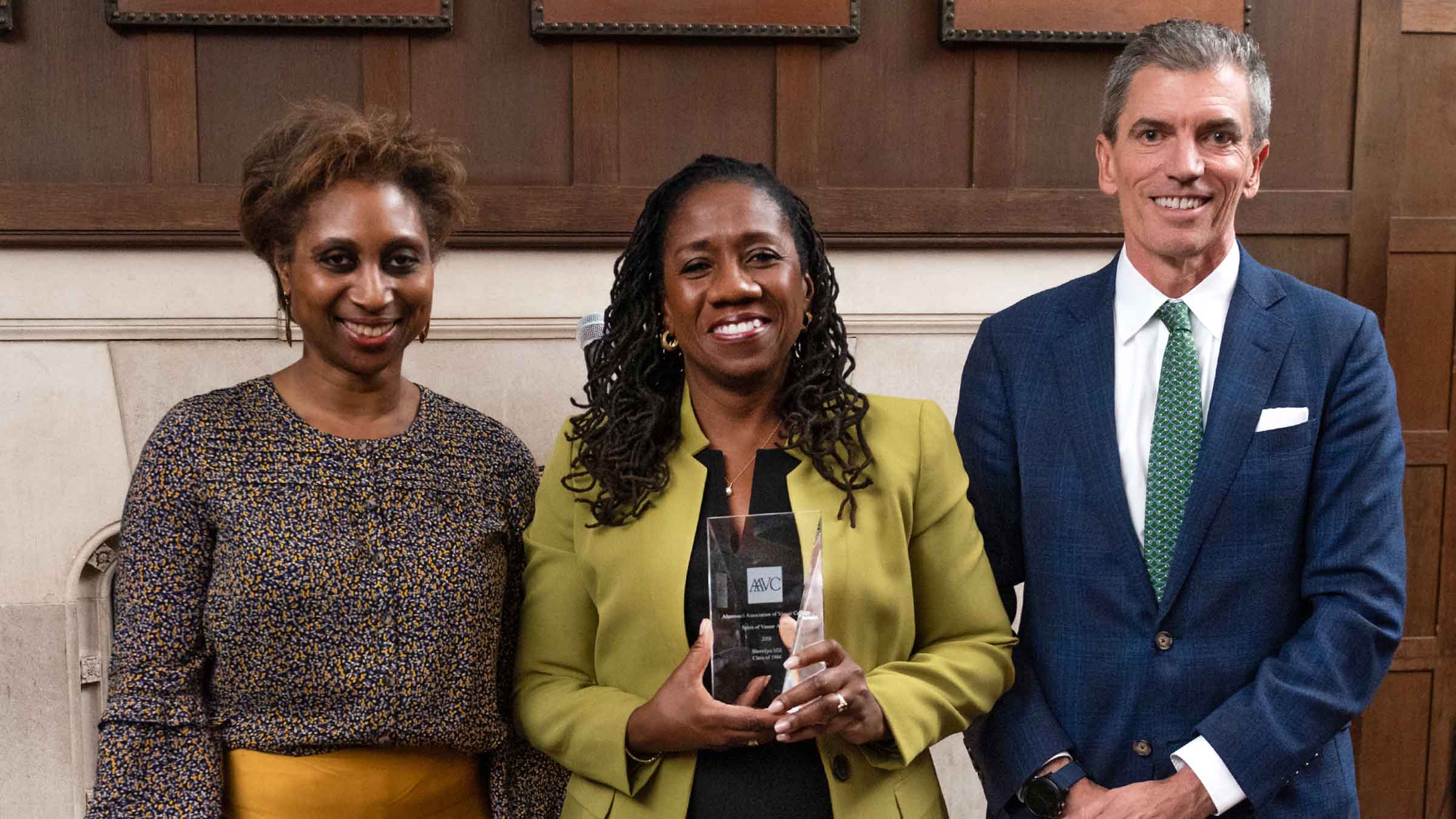Divisiveness in the nation’s current political climate is threatening to rip the fabric of our democracy, but that threat can be averted if more of us exercise our responsibilities as citizens. That was the message renowned civil rights attorney Sherrilyn Ifill ’84 delivered to the Vassar community and others during a series of events on the campus on Friday, February 22.
That day, Ifill, President and Director-Counsel of the NAACP Legal Defense and Educational Fund (LDF), received the Spirit of Vassar Award, presented annually by the Alumnae/i Association of Vassar College (AAVC) to an alumna or alumnus who has demonstrated extraordinary and distinguished leadership in which they effect positive, transformative societal change.
Before she received the award at a dinner hosted by the AAVC at Alumnae House, Ifill spoke to students and other guests of the African American Alumnae/i of Vassar College (AAAVC) at a fireside chat in Alumnae House and to local residents and members of the Vassar community at an hour-long forum at the Martel Theater.
She told both audiences they had some work to do to preserve democracy. “This is a pivotal moment in American history,” Ifill said. “Every pillar of democracy is under attack—the media, our education system, voting rights—and parents are being separated from their children for political reasons.
“This country has lost its way, and I do not think finding it is inevitable. But I’m an optimist; I think we will fight for our democracy, and believe me, we will have to fight.”
AAAVC’s fireside chat was moderated by Taneisha Means, Assistant Professor of Political Science on the Class of 1951 Chair, who conducts research on how the presence of black judges is affecting the judicial system. Tracy Poole ’82, AAAVC co-chair, says AAAVC wanted to ensure that students were active participants in the forum; students were asked to submit questions and to directly interact with Ifill during the Q&A.
Asked about her influences as a child, Ifill said she remembered being “bored” by the Watergate hearings when she was 8 years old—until she heard then-Congresswoman Barbara Jordan, the lone black woman on the House Judiciary Committee, speak. “She affected me profoundly,” Ifill said. “She was the most powerful speaker I had ever heard.”
Ifill said that when she first joined LDF at age 25, she didn’t always feel adequately prepared to face the daunting challenges that came with civil rights work, “but the people you’re representing are so hopeful, you never feel you can let them down.” LDF, she said, is “a conduit for our clients to speak or [we say] things for them that they can’t say themselves.”

When she was asked to list some of the most significant cases her organization had litigated, Ifill said almost everyone focuses on Brown v. Board of Education (1954), which declared segregation in public schools to be unconstitutional. But she noted that the LDF attorney who won that case, Thurgood Marshall, did not consider it to be the most significant of his career. Instead, Ifill said, Marshall pointed to a case in Texas that challenged the state Democratic Party’s rule that barred blacks from voting in primary elections. Marshall considered that case the most important, she said, because he believed that all other rights stemmed from the right to vote.
During the public forum at the Martel Theater that afternoon, Ifill expanded on her thoughts about voting rights when moderator Rebecca Edwards, Professor of History on the Eloise Ellery Chair, asked, “How can we support your work?”
Too many of us don’t exercise our citizenship,” Ifill replied. “We don’t pay much attention to voting except in presidential elections. Even then, we don’t vote for many of the other candidates down the ballot. And we don’t often educate ourselves about the qualifications of those on the ballot.”
Ifill noted that a 2013 Supreme Court decision had weakened federal voting rights laws, and she endorsed a bill pending in Congress that would reverse some rulings that hinder blacks, Latinx, and young people from voting.

Asked to comment on the potential threat of artificial intelligence, particularly as it pertains to the algorithms that run social media, Ifill said it was an issue her organization was studying closely. “We often accept the convenience of AI without allowing for the biases that are built into it because these algorithms are created by human beings with prejudices,” she said. “So by their nature, they are biased, and we are way behind in dealing with this.”
Ifill dismissed the arguments posed by Facebook executives and others in social media that their industry should not be regulated. “People always argue regulation will destroy them,” she said. “When people argued for seat belts, the auto industry howled. The oil industry said taking lead out of gasoline would kill them.”
As she accepted the Spirit of Vassar Award at the AAVC dinner, Ifill noted that she was receiving it in the same room where she had held her wedding reception. “This is quite an emotional moment for me; it means a lot to be recognized at this special place where I developed the ideas that enable me to do what I do,” she said.
Ifill received the award from AAVC President Steve Hankins ’85, P’13, P’17 and fellow classmate Sharon Davidson Chang ’84, P’19, Alumnae/i Recognition Committee Chair. Hankins, who praised Ifill as “one of the leading legal minds in the country on civil rights,” told her, “Vassar’s pride in you and your achievements is immense.”
Chang, who sang in Vassar’s Gospel Choir and took English classes with Ifill, said she could not have been more thrilled to be honoring her former classmate. “Sherrilyn fits the bill for this award in so many ways,” she noted.
